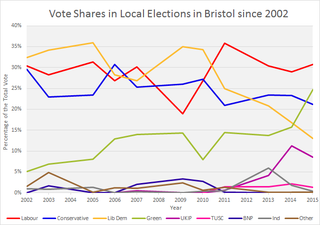
Bristol is a unitary authority and ceremonial county in England. Until 1 April 1996 it was a non-metropolitan district in Avon. Since 2012 it has also had a directly elected mayor.
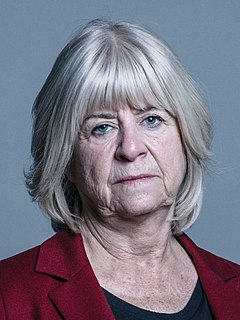
Barbara Lilian Janke, Baroness Janke is a British teacher and politician. She was the Liberal Democrat leader of Bristol City Council from 2005 to 2007 and from 2009 to 2012. She has been Councillor for Clifton ward since 1995. She was leader of the Liberal Democrat group since 1997, with a break from 2007 to 2008. In August 2014 Cllr Janke was named as one of six new Liberal Democrat working peers.

The city of Bristol, England, is a unitary authority, represented by four MPs representing seats wholly within the city boundaries. As well as these, Filton and Bradley Stoke covers the northern urban fringe in South Gloucestershire and the north eastern urban fringe is in the Kingswood constituency. The overall trend of both local and national representation became left of centre, favouring the Labour Party and Liberal Democrats during the latter 20th century, but there was a shift to the right in the 2010 general election. The city has a tradition of local activism, with environmental issues and sustainable transport being prominent issues in the city.

The 1986 Bristol City Council election took place on 8 May 1986 to elect members of Bristol City Council in England. This was on the same day as other local elections. One third of seats in the 1986 Council Elections in the English city of Bristol were up for election. The election in Brislington West was a by-election. There was a small swing away from the Conservatives and Labour regained a majority on the Council, which they kept until 2003.

The 1988 Bristol City Council election took place on 5 May 1988 to elect members of Bristol City Council in England. This was on the same day as other local elections. One third of seats were up for election. This was the first election following the merger of the Liberal Party and SDP to form the Social & Liberal Democrats. There were also several candidates representing the continuing SDP. There was a general small swing to Labour.

The 1991 Bristol City Council election took place on 2 May 1991 to elect members of Bristol City Council in England. This was on the same day as other local elections. One third of seats were up for election. Two seats were contested in Windmill Hill due to an extra vacancy occurring. There was a general swing against the Conservatives. In Lockleaze, the Labour Party failed to field a candidate because of a nomination papers error.

The 1992 Bristol City Council election took place on 7 May 1992 to elect members of Bristol City Council in England. This was on the same day as other local elections. One third of seats were up for election. Two seats were contested in Hartcliffe due to an extra vacancy occurring. The elections were held just weeks after John Major's unexpected 1992 General election victory, and mirroring that result there was a strong swing from Labour to Conservative.
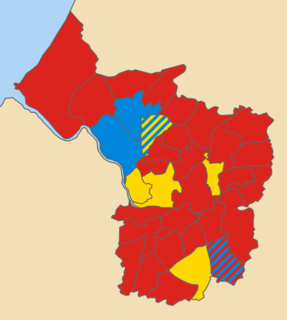
The 1995 Bristol City Council election took place on 4 May 1995 with all seats being up for election, in preparation for Bristol City Council becoming a Unitary Authority following the abolition of Avon County Council. The same ward boundaries were used, however these are elections to a new authority and cannot be considered gains or losses compared to previously held seats.
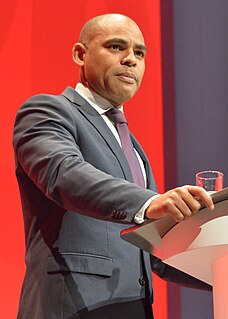
The Mayor of Bristol is the head of Bristol City Council. The Mayor is an elected politician who, along with the 70 members of Bristol City Council, is responsible for the strategic government of the city of Bristol, England. The role was created after a local referendum held on 3 May 2012, which followed the passage of the Localism Act 2011. 41,032 voted for an elected mayor and 35,880 voted against, with a turnout of 24%. An election for the new post was held on 15 November 2012.
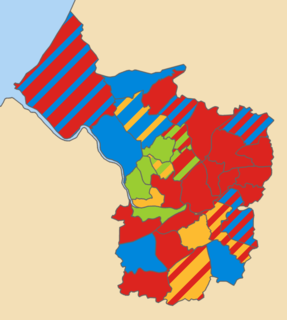
The 2016 Bristol City Council election took place on Thursday 5 May 2016, alongside nationwide local elections. Following a boundary review, the number of wards in the City was reduced to 34, with each electing one, two or three Councillors. The overall number of Councillors remained 70, with all seats are up for election at the same time. Elections would then be held every 4 years.

The 1973 Bristol City Council election took place on 7 June 1973 to elect members of Bristol City Council in England. This was on the same day as other local elections. Voting took place across 28 wards, each electing 3 Councillors. Following the Local Government Act 1972, this was the first election to the new non-metropolitan district council for Bristol, which came into being on 1 April the following year. Labour took control of the Council after winning a comfortable majority of seats.

The 1976 Bristol City Council election took place on 6 May 1976 to elect members of Bristol City Council in England. This was on the same day as other local elections. Labour retained overall control of the council despite losing 9 seats to the Conservatives.

The 1979 Bristol City Council election took place on 3 May 1979 to elect members of Bristol City Council in England. This was on the same day as other local elections and the 1979 general election. In contrast to the Conservative landslide in the national election, the Conservatives in Bristol lost 6 seats to Labour, who maintained overall control of the council.

The 1999 Bristol City Council election took place on 6 May 1999, on the same day as other local elections. All seats were up for election due to boundary changes, with each ward electing 2 councillors. The total number of seats on the council increased by 2 due to the creation of a new ward: Clifton East.

The 2001 Bristol City Council election took place on 7 June 2001, on the same day as other local elections. The Labour Party made a small number of gains and maintained overall control of the council.

The 2002 Bristol City Council election took place on 2 May 2002, on the same day as other local elections. Despite suffering some losses, the Labour Party managed to retain a slim majority.

The 2003 Bristol City Council election took place on 1 May 2003, on the same day as other local elections in the UK. The Labour Party made a number of losses, mainly to the Liberal Democrats, and lost overall control of the council. Loses included Council leader Diane Bunyan, who lost her Windmill Hill seat to the Liberal Democrats. This year also saw elections contested by the new Bristolian Party, founded by the local 'scandal sheet' The Bristolian, though they failed to win any seats.
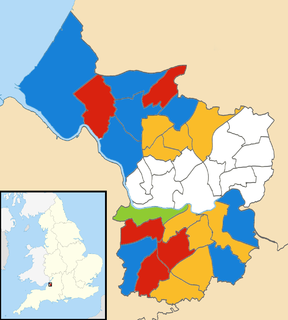
The 2006 Bristol City Council election took place on 4 May 2006, on the same day as other local elections. The Labour Party continued to lose seats, but the Liberal Democrats failed to gain enough to form an overall majority. This election saw the first election of a Green Councillor to Bristol City Council – the first time four parties had been represented since the Council’s creation.

The 2007 Bristol City Council election took place on 3 May 2007, on the same day as other local elections. The Liberal Democrats lost 2 seats to Labour, but remained the largest party on the Council. No party gained overall control.




















